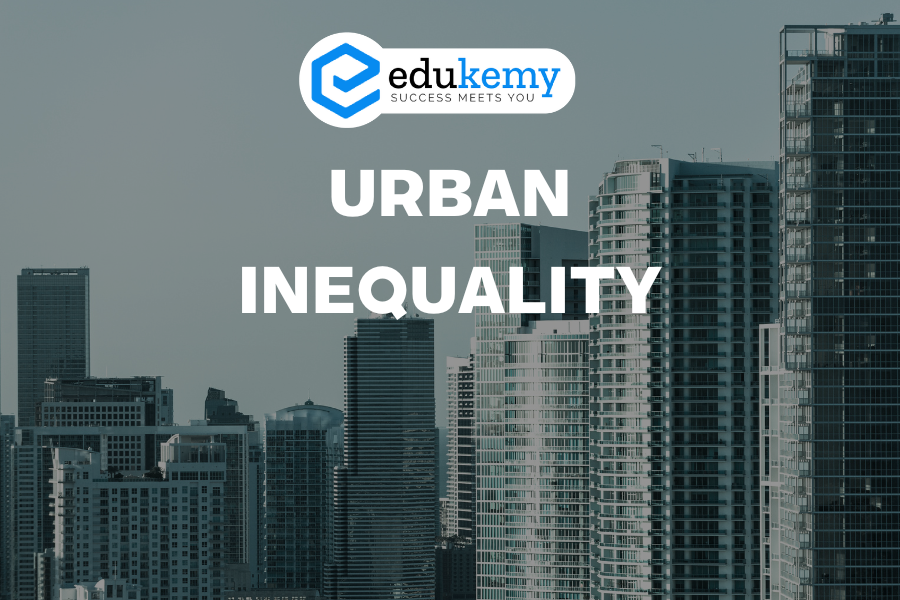
Urban inequality is a multifaceted phenomenon that permeates the fabric of cities worldwide, manifesting in disparities across various socio-economic indicators such as income, education, healthcare, and access to basic services. Within the bustling landscapes of urban centers, stark contrasts emerge between affluent neighborhoods boasting opulent skyscrapers and impoverished areas grappling with dilapidated infrastructure and limited opportunities. This stark division not only reflects deep-rooted structural inequities but also underscores the complex interplay of factors like historical legacies, government policies, and global economic forces. As urbanization continues to accelerate, understanding and addressing the intricacies of urban inequality have become imperative in fostering inclusive, sustainable cities where all residents can thrive.
Urban Inequality
- As skilled population move to cities and considering the trend of the increased urbanization, government focus has also shifted from rural to urban area.
- Consequently, rural areas have started witnessing social changes like transformation of workforce (feminization), changes in land relations, absence of leadership etc.
- The above is not an exhaustive list of the problems of urbanization. A whole lot of other problems including increasing rate of crime in the cities, increasing old age population and absence of social security for them, enhanced role and sphere of market has led to the poor and marginalized suffering the most.
- Studies have also shown that stress levels are found high in cities, which in turn has deleterious impact on the health of the people.
FAQs
Q: What is urban inequality?
Urban inequality refers to the disparities in wealth, income, access to resources, opportunities, and quality of life among individuals and communities within urban areas. It encompasses various dimensions such as socio-economic status, education, healthcare, housing, and employment opportunities.
Q: What factors contribute to urban inequality?
Urban inequality is influenced by a multitude of factors including economic disparities, uneven distribution of resources, systemic discrimination, historical injustices, urban planning policies, gentrification, lack of affordable housing, inadequate access to education and healthcare, and unequal opportunities for employment and upward mobility.
Q: How does urban inequality affect communities?
Urban inequality perpetuates cycles of poverty and marginalization, leading to social unrest, decreased social cohesion, and diminished trust in institutions. It hampers economic growth and development by limiting the potential of marginalized communities. Moreover, it can exacerbate health disparities, increase crime rates, and widen the gap between the rich and poor.
Q: What are some strategies to address urban inequality?
Addressing urban inequality requires a multifaceted approach involving policy interventions, community empowerment, and social initiatives. This includes implementing equitable urban planning policies, investing in affordable housing and infrastructure development, promoting inclusive economic growth through job creation and skills training programs, enhancing access to quality education and healthcare, combating discrimination and promoting diversity, and fostering community participation in decision-making processes.
Q: What are the long-term consequences of ignoring urban inequality?
Ignoring urban inequality can lead to deepening social divisions, heightened tensions, and increased social unrest. It can undermine the stability and sustainability of urban areas, hamper economic growth, and perpetuate intergenerational poverty. Moreover, it can erode trust in government institutions and exacerbate inequalities, ultimately threatening the overall well-being and prosperity of society. Addressing urban inequality is not only a moral imperative but also essential for fostering inclusive and sustainable urban development.
In case you still have your doubts, contact us on 9811333901.
For UPSC Prelims Resources, Click here
For Daily Updates and Study Material:
Join our Telegram Channel – Edukemy for IAS
- 1. Learn through Videos – here
- 2. Be Exam Ready by Practicing Daily MCQs – here
- 3. Daily Newsletter – Get all your Current Affairs Covered – here
- 4. Mains Answer Writing Practice – here

